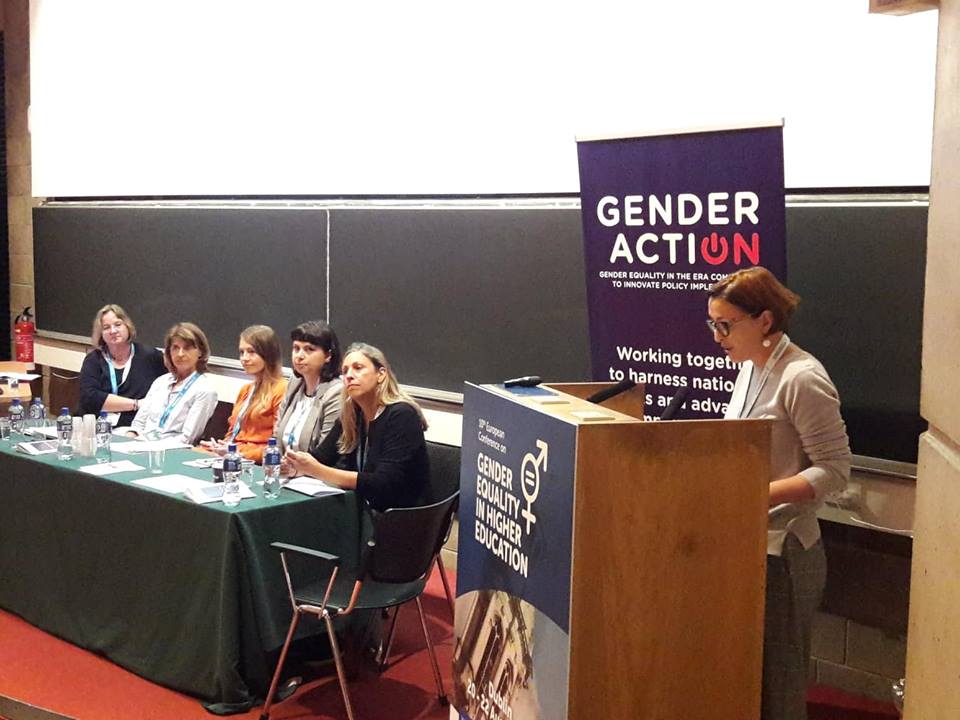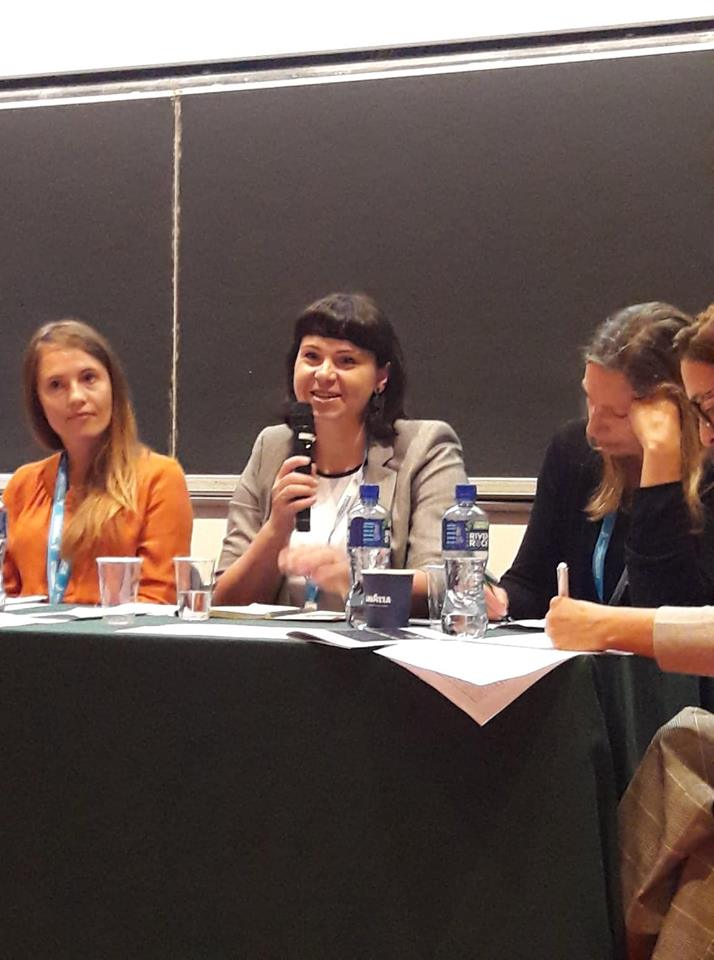GENDERACTION panel on GEHE2018
11.9.2018
Marcela Linková
Some progress achieved but a strong push for gender equality to be maintained. Cooperation between Member States and the Commission is crucial for advancing gender equality in European research. Provisions for gender equality in Horizon Europe must be strengthened.
The GENDERACTION panel titled What are we talking about when we talk about gender equality took place on 22 August 2018, day 3 of the 10th European conference on gender equality in higher education organized at the Trinity College Dublin, Ireland. We are proud that the GENDERACTION panel had a balanced number of participants from older and newer Member States, as the overall number of participants from Central and Eastern Europe at the conference was unfortunately negligible.
 The panel was convened by Angela Wroblewski, senior researcher at the Institute of Advanced Studies in Vienna, and GENDERACTION coordinator Marcela Linková from the Institute of Sociology of the Czech Academy of Sciences, and featured four panellists: Magdalena Chrobak-Tatara, Chief Specialist at Department of Innovation and Development, Ministry of Science and Higher Education, Poland; Veronika Fajmonová, gender equality coordinator at the Ministry of Education, Youth and Sports, Czech Republic; Anne Pépin, Senior Policy Officer at the Gender Sector of DG RTD, European Commission, and Roberta Schaller-Steidl, Head of the Department Gender Equality and Diversity Management at the Federal Ministry of Education, Science and Research, Austria.
The panel was convened by Angela Wroblewski, senior researcher at the Institute of Advanced Studies in Vienna, and GENDERACTION coordinator Marcela Linková from the Institute of Sociology of the Czech Academy of Sciences, and featured four panellists: Magdalena Chrobak-Tatara, Chief Specialist at Department of Innovation and Development, Ministry of Science and Higher Education, Poland; Veronika Fajmonová, gender equality coordinator at the Ministry of Education, Youth and Sports, Czech Republic; Anne Pépin, Senior Policy Officer at the Gender Sector of DG RTD, European Commission, and Roberta Schaller-Steidl, Head of the Department Gender Equality and Diversity Management at the Federal Ministry of Education, Science and Research, Austria.
Following a brief presentation of the GENDERACTION project and its main achievements so far, Angela Wroblewski presented the results of her analysis of the ERA Roadmap National Action Plans and Strategies (NAPS). The analysis shows marked differences between how gender equality is conceptualized in the NAPS. 62% of the NAPS do not contain any definition of gender (equality), 57% of NAPS address all 3 objectives in context/gender analysis but most of the NAPS do not contain any concrete objectives and tasks. A minority of four countries has comprehensive NAPS with a fully developed  understanding of gender equality but most countries tend to focus on one or two of the objectives. Some contain only a general commitment to gender equality or do not have concrete actions al all. There appears to be a gap between the older and newer Member States although this is not linear (Slovenia has a complex understanding of gender equality).
understanding of gender equality but most countries tend to focus on one or two of the objectives. Some contain only a general commitment to gender equality or do not have concrete actions al all. There appears to be a gap between the older and newer Member States although this is not linear (Slovenia has a complex understanding of gender equality).
The panel was convened to discuss the opportunities for and barriers to advancing gender equality in research in Member States and the European Commission. The panellists from Member States all agreed that the role of the European Commission and the European Research Area with the NAPS are crucial for advancing the gender equality agenda in the national context. “The narrative in the Czech Republic is currently changing toward human resources development, work-life balance issues and the pay gap”, said Veronika Fajmonová of the Czech Republic, and stressed that the EU was important in terms of both strategies and funding. In Poland, the EU is an important point of reference. “Gender equality policies are generally framed as a women’s issue, and the dominant frameworks are excellence and equal opportunities,” said Magdalena Chrobak-Tatara. Not enough attention is paid to the gender dimension in research. In addition, on 1 October 2018 a new law on higher education and science comes into effect in Poland, which will strengthen the autonomy of universities. It will be up to the Higher Education Institutions to develop their own strategies and up to the academic community to decide how universities should function. Austria combines both top-down and bottom-up approaches. “The national ERA roadmap is the most important policy document, and EU recommendations are treated as an obligation,” explained Roberta Schaller-Steidl. Active links exist with national gender equality stakeholders.
 For the European Commission, Member States are at the core of its policy work; the ERAC Standing Working Group on Gender in Research and Innovation is one of the key structures in which dialogue takes place among MS on the one hand and the MS and the European Commission on the other. “The Commission funded initiatives in recent years to build the ground for research performing and research funding institutions to take up gender equality plans, such as the GEAR tool co-developed by the European Institute for Gender Equality and DG RTD, and several Horizon 2020 projects funded under the Science-with-and-for-Society such as the ACT project for developing communities of practice launched this year, and the Gender Equality Academy to be launched in 2019,” said Anne Pépin. There are also projects for Member States and Associated Countries to exchange and learn from each other such as GENDERACTION, she continued. Panel moderator Marcela Linková concluded that cooperation is necessary at all levels – between stakeholders and national representatives at national level and there must also be a two-way traffic on gender equality between the European Commission and the Member States, in order to “create a self-reinforcing spiral of gender equality policy in the EU”.
For the European Commission, Member States are at the core of its policy work; the ERAC Standing Working Group on Gender in Research and Innovation is one of the key structures in which dialogue takes place among MS on the one hand and the MS and the European Commission on the other. “The Commission funded initiatives in recent years to build the ground for research performing and research funding institutions to take up gender equality plans, such as the GEAR tool co-developed by the European Institute for Gender Equality and DG RTD, and several Horizon 2020 projects funded under the Science-with-and-for-Society such as the ACT project for developing communities of practice launched this year, and the Gender Equality Academy to be launched in 2019,” said Anne Pépin. There are also projects for Member States and Associated Countries to exchange and learn from each other such as GENDERACTION, she continued. Panel moderator Marcela Linková concluded that cooperation is necessary at all levels – between stakeholders and national representatives at national level and there must also be a two-way traffic on gender equality between the European Commission and the Member States, in order to “create a self-reinforcing spiral of gender equality policy in the EU”.
The discussion with the panellists and the audience tended to revolve around the Horizon Europe proposal. The main messages of the panel discussion and audience are the following:
- Gender equality must be preserved as one of the priorities of the European Research Area.
- Gender equality must be strengthened in the proposal for Horizon Europe.
- Research and Innovation Actions on gender equality should be supported in Horizon Europe.
- Bottom-up gender equality plan projects should continue in Horizon Europe; a recognition mechanism should be put in place for institutions that have a Gender Equality Plan.
- The budget line for the Horizon Europe ‘Strengthening the ERA’ programme part, and particularly the intervention area on gender equality within the sub-part on ‘Reforming and enhancing the EU R&I system’ should be increased. With 11 areas of intervention that are wider than those of the Horizon 2020 Science With and For Society programme, the budget is smaller.
- A particular issue discussed was the inclusion of parental leave / work-life balance provisions in Horizon Europe.
- The ERAC Standing Working Group on Gender in Research and Innovation has an important role and its visibility and cooperation with, and accountability to, stakeholders must be strengthened at the EC level (e.g. ERA Stakeholders Platform) and national level (gender experts and practitioners).


